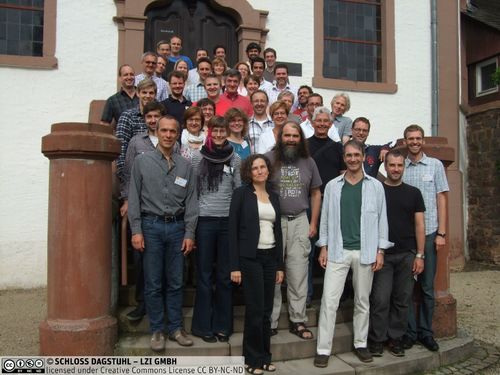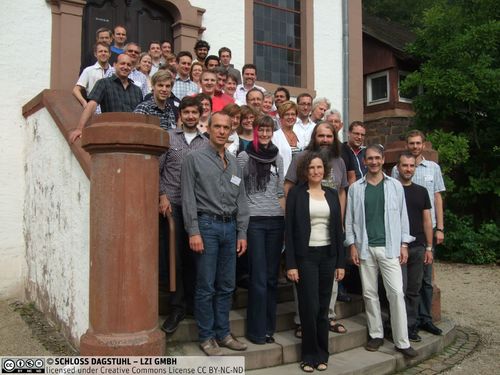Dagstuhl Seminar 12351
Interaction Beyond the Desktop
( Aug 26 – Aug 31, 2012 )
Permalink
Organizers
- Alan Dix (University of Birmingham, GB)
- James D. Hollan (University of California - San Diego, US)
- Albrecht Schmidt (Universität Stuttgart, DE)
- Jürgen Steimle (MIT - Cambridge, US)
Contact
- Andreas Dolzmann (for scientific matters)
- Susanne Bach-Bernhard (for administrative matters)
Impacts
- Interaction Beyond the Desktop : Special Issue : pp. 385-523 - Steimle, Jürgen; Hornecker, Eva; Schmidt, Albrecht - Berlin : Springer, 2014 - (Informatik Spektrum : 37. 2014, 5).
- Kurzbericht zum Dagstuhl-Seminar ,,Interaction Beyond the Desktop“ : pp. 498-499 : article - Schmidt, Albrecht; Steimle, Jürgen; Dix, Alan John; Hollan, James D. - Berlin : Springer, 2014 - (Informatik Spektrum : 37. 2014, 5).
- Visions and Visioning in CHI : CHI 2013 Special Interest Group Meeting - Quigley, Aaron; Ishii, Hiroshi; Dix, Alan; Steimle, Jürgen; Mackay, Wendy E. - www.visionsofcomputing.org, 2013. - 4 pp..
With the emergence of new hardware devices, ubiquitous wireless networks, and the increasing proliferation of computing devices in everyday life, we are entering a new era that is becoming known as post-desktop interaction. Although multiple new interaction techniques are being explored in current research in ubiquitous computing, tangible interaction, interactive surfaces and multitouch interaction, virtual and augmented reality, context-aware computing, and mobile interaction, understanding interaction beyond the desktop is still in its infancy. This is particularly complex and challenging because interaction is now situated in diverse contexts, increasingly involves exploiting the physical surroundings as well as simultaneous use of mobile computing devices, and frequently consists of multiple participants employing multiple modalities of interaction. This creates radically different requirements and research challenges than those of the desktop and the single-user graphical interface.
The aim of our Dagstuhl Seminar is to bring together leading experts and exceptionally talented junior researchers working in a diverse set of fields (computer science, psychology, cognitive science, and design) to provide the multidisciplinary perspective required to address the full complexity of this crucial topic. The seminar is not about a publication, nor about sharing your current research results. It is about taking time to get a new perspective, to get impulses for new research, to be inspired. We will create a program that ensures ample time for discussions, breakout groups, and informal exchanges, e.g. during hikes. The seminar provides a venue for:
- Reflecting on the current state of the field, discussing evolving paradigms and techniques and integrating them into a coherent paradigm or conceptual framework to help focus research and motivate interdisciplinary interactions
- Discussing current challenges and identifying research directions
- Reflecting on the transformations that ubiquitous computing is creating in society
- Reflecting on what is beyond ubicomp.
We suggest six key perspectives on interaction beyond the desktop as a basis for our discussions:
- Interaction-Centered Perspective: What are the communalities and deeper characterizations of the novel paradigms and techniques that are currently emerging? What interaction devices, techniques, paradigms should be explored in the future?
- Integration-Centered Perspective: What is the appropriate technological basis for integrating multiple devices in a multi-participant environment?
- Ecology-Centered Perspective: Interaction beyond the desktop is applied in and leads to different ecologies of use than desktop computers. How do individual and collaborative practices evolve, what are the novel practices that emerge, and how do social norms change?
- Cognition-Centered Perspective: How can our developing knowledge of distributed and embodied cognition be exploited to better understand and design post-desktop interaction?
- User-Domain-Centered Perspective: What are promising application domains for research to focus on? What specific domains might lead to better interdisciplinary interaction, collaboration, and synergy?
- Information-Centered Perspective: What knowledge does a computing device or device federation need about the past and the current situation? How can context information be beneficially exploited? How can privacy be preserved?
We expect the seminar to lead to the production of a book on interaction beyond the desktop and to help initiate and extend international research and develop collaborations. If successful the seminar can be a birthplace for new ideas in an area with enormous potential impact in academia, industry and everyday life.
- Michel Beaudouin-Lafon (University of Paris South XI, FR) [dblp]
- Susanne Boll (Universität Oldenburg, DE) [dblp]
- Alvaro Cassinelli (University of Tokyo, JP)
- Alan Dix (University of Birmingham, GB) [dblp]
- Tanja Döring (Universität Bremen, DE)
- Geraldine Fitzpatrick (TU Wien, AT) [dblp]
- Steve Gill (Cardiff Metropolitan University, GB)
- Jonna Häkkilä (University of Oulu, FI) [dblp]
- Niels Henze (Universität Stuttgart, DE) [dblp]
- Uta Hinrichs (University of St. Andrews, GB) [dblp]
- James D. Hollan (University of California - San Diego, US) [dblp]
- Clare Hooper (University of Southampton, GB)
- Eva Hornecker (University of Strathclyde, GB) [dblp]
- Jochen Huber (TU Darmstadt, DE)
- Johann Habakuk Israel (FhG IPK - Berlin, DE)
- Hans-Christian Jetter (Universität Konstanz, DE) [dblp]
- Thorsten Karrer (RWTH Aachen, DE)
- Gudrun Klinker (TU München, DE) [dblp]
- Antonio Krüger (DFKI - Saarbrücken, DE) [dblp]
- Wendy E. Mackay (University of Paris South XI, FR) [dblp]
- Rainer Malaka (Universität Bremen, DE)
- Ann Morrison (Aalborg University, DK)
- Max Mühlhäuser (TU Darmstadt, DE) [dblp]
- Jörg Müller (TU Berlin, DE) [dblp]
- Simon Olberding (MIT - Cambridge, US)
- Joseph A. Paradiso (MIT - Cambridge, US) [dblp]
- Bastian Pfleging (Universität Stuttgart, DE) [dblp]
- Aaron Quigley (University of St. Andrews, GB) [dblp]
- Harald Reiterer (Universität Konstanz, DE) [dblp]
- Bernard Robben (Universität Bremen, DE)
- Michael Rohs (Universität Hannover, DE) [dblp]
- Enrico Rukzio (Universität Ulm, DE) [dblp]
- Alireza Sahami (Universität Stuttgart, DE) [dblp]
- Christian Sandor (University of South Australia - Mawson Lakes, AU) [dblp]
- Arvind Satyanarayan (Stanford University, US) [dblp]
- Bernt Schiele (MPI für Informatik - Saarbrücken, DE) [dblp]
- Albrecht Schmidt (Universität Stuttgart, DE) [dblp]
- Johannes Schöning (Hasselt University - Diepenbeek, BE) [dblp]
- Jürgen Steimle (MIT - Cambridge, US) [dblp]
- Aurélien Tabard (IT University of Copenhagen, DK) [dblp]
- Kaisa Väänänen (Tampere University of Technology, FI) [dblp]
- Volker Wulf (Universität Siegen, DE) [dblp]
Classification
- society / HCI
- multimedia
- mobile computing
- ubiquitous computing
- tangible interaction
Keywords
- Interaction Techniques
- Interactive Surfaces
- Mobile Devices
- Tangible Interaction
- Smart Spaces
- Ubiquitous Computing
- Desktop Metaphor



